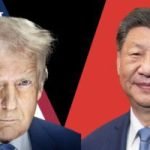
Navigating the Waters of Political Discourse: A Personal Perspective
This post explores the unraveling of political discourse in the lead-up to the 2024 U.S. election. From Trump’s strange cognitive test claims to Steve Bannon’s third-term push, and JD Vance’s xenophobic rhetoric, we analyze the shifting landscape of democracy. Citizens are urged to engage, stay informed, and recognize the vital role of civic duty in protecting democratic norms.
The intersection of cognitive awareness in political discourse, the implications of Trump’s actions, and the ever-evolving landscape of American politics as we approach the 2024 elections. It emphasizes the need for active engagement in political discussions and promotes awareness of the underlying issues at play.
Imagine sitting at a coffee shop, sipping your latte, and overhearing a conversation about a well-known politician discussing their cognitive abilities in almost theatrical fashion. It’s comical yet concerning, particularly when the stakes are so high. This personal reflection on the absurdities of political discourse in today’s climate prompts a broader discussion about the implications of leadership and the responsibilities of citizens.
The Cognitive Dissonance of Political Figures
When we think about political leaders, we often consider their policies, charisma, and ability to connect with the public. But what about their mental fitness? Recently, the spotlight has been on Donald Trump and his claims regarding cognitive tests. He has repeatedly stated, “I got the highest mark,” referring to a cognitive assessment he took during a physical exam. But what does this really mean for us as citizens?
Exploring Trump’s Cognitive Test Claims
Trump’s assertions about his cognitive abilities raise eyebrows. He boasts about scoring the highest on a cognitive test, which he claims is the best result ever seen by a doctor. But is this just political posturing? Or does it reflect a deeper issue? When a leader feels the need to emphasize their cognitive prowess, it might suggest insecurity. After all, if you have to keep telling people you’re smart, are you really that confident?
- Trump’s claims could be seen as a way to reassure his supporters.
- But they also invite skepticism about his actual cognitive awareness.
As we analyze these claims, we must ask ourselves: What does it mean for our understanding of leadership? Is cognitive awareness a crucial trait for those in power? I believe it is. A leader’s mental acuity can significantly impact decision-making and public trust.
The Significance of Cognitive Awareness in Leadership
Cognitive awareness is not just a buzzword. It’s essential for effective leadership. Leaders must navigate complex issues, make quick decisions, and communicate clearly. If a leader struggles with cognitive tasks, how can they effectively govern? This concern is not new. Throughout history, we’ve seen how past presidents have dealt with inquiries about their mental fitness.
For instance, when President Reagan faced questions about his age and mental sharpness, he addressed them head-on. He understood that public perception mattered. Today, we see a similar dynamic with Trump. His repeated emphasis on cognitive tests reflects a broader concern about mental fitness in leadership. According to recent surveys, a significant percentage of citizens express concern about the cognitive fitness of their leaders. This is not just a trivial matter; it has public health implications.
Personal Anecdotes and Public Demeanor
Reflecting on political figures, I recall various anecdotes that illustrate the disconnect between public persona and private reality. For example, some leaders project confidence and decisiveness, yet behind closed doors, they may struggle with self-doubt. This duality can create a sense of cognitive dissonance. It’s fascinating to observe how public demeanor can mask underlying issues.
Take, for instance, the way Trump presents himself. His bravado often overshadows any doubts about his cognitive abilities. Yet, as one observer noted, “The way he says cognitive it’s insane.” This statement encapsulates the absurdity of his claims and the public’s reaction. It raises questions about authenticity and the pressures of political life.
In conclusion, the cognitive dissonance of political figures like Trump highlights the importance of mental fitness in leadership. As citizens, we must remain vigilant and question the narratives presented to us. The stakes are high, and our understanding of leadership is at the forefront of this discussion.
The Chaos Within Trump’s Orbit: Predictions and Analysis
As we look ahead to the 2024 election, the political landscape is anything but stable. One figure who stands out in this chaotic environment is Steve Bannon. His influence is palpable, and his ambitions are clear: he is pushing for Trump’s third term. But what does this mean for the future of American democracy?
Steve Bannon’s Role
Bannon is not just a former advisor; he is a strategist with a vision. His efforts to manipulate constitutional regulations to allow Trump to run again raise serious questions. Can we really amend the Constitution just to fit a political agenda? It feels like a slippery slope. As I ponder this, I can’t help but wonder: What are the implications for our democratic processes?
- Bannon’s influence could reshape the political landscape.
- His strategies may undermine the very fabric of democracy.
- We must consider the historical context of presidential term limits.
In a way, Bannon’s push for a third term feels like a challenge to the norms we’ve held dear. It’s as if he’s saying, “Why not?” But the consequences could be dire. The potential ramifications of his plans could lead to a significant shift in how we view leadership and governance.
Political Strategies of Trump’s Supporters
Now, let’s analyze the political strategies being implemented by Trump’s supporters. They are not just sitting back; they are actively working to secure a favorable outcome for their candidate. This includes organizing referendums around Trump’s candidacy. It’s a grassroots movement that is gaining traction.
But what does public sentiment look like? Current approval ratings show that Trump still holds a strong position among Republican voters. This loyalty is both fascinating and frightening. It raises the question: Are we witnessing a shift in political allegiance that could redefine the Republican Party?
- Referendums are being planned to gauge support.
- Trump’s approval ratings remain high among his base.
- Grassroots movements are becoming more organized.
As I engage in conversations around me, I notice a mix of enthusiasm and concern. Some people are excited about the prospect of Trump returning, while others are deeply worried about the implications. It’s a reflection of the divided nature of our society.
Unique Challenges of the 2024 Election
Reflecting on the unique challenges of the upcoming election, I can’t help but feel a sense of urgency. The political climate is charged, and the stakes are higher than ever. We are not just voting for a candidate; we are voting for the future of our democratic norms.
As crazy as that sounds, we need to take this very seriously. The normalization of extreme rhetoric and actions is alarming. It’s not just about Trump; it’s about what his potential return signifies for our political discourse.
In my observations, I see a troubling trend. The conversations around me often reflect a casual dismissal of serious issues. It’s as if we are becoming desensitized to the chaos. This is where I believe we must draw the line. We need to engage, to protest, and to be active participants in our democracy.
The chaos within Trump’s orbit is not just a political spectacle; it is a call to action. We must remain vigilant and informed. The future of our democracy depends on it.
The Intersection of Xenophobia and Foreign Policy
Xenophobia is a term we hear often, especially in political discussions. But what does it really mean? At its core, xenophobia is the fear or hatred of people from other countries. This fear can manifest in many ways, especially through rhetoric used by politicians. One such politician is JD Vance, whose statements on immigration have sparked significant controversy.
Examining JD Vance’s Controversial Statements
Vance has made headlines for his remarks that many consider xenophobic. He often uses language that paints immigrants in a negative light. For example, he has suggested that immigrants are a threat to American values and safety. This kind of rhetoric is not just harmful; it can be dangerous. It feeds into a narrative that justifies discrimination and hostility towards those who are different.
When politicians like Vance speak this way, they are not just expressing personal opinions. They are reflecting and shaping broader societal attitudes. It’s like throwing a stone into a pond—the ripples spread far and wide. The implications of such statements can be profound. They can lead to increased fear and division within communities.
Understanding the Implications of Xenophobic Rhetoric
So, what happens when xenophobic rhetoric becomes commonplace? The impact can be felt in various ways. For one, it can lead to a rise in hate crimes. Statistics show that incidents of hate crimes often spike following inflammatory political statements. This is not just a coincidence; it’s a direct result of the environment created by such rhetoric.
- Percentage of immigrants feeling affected by political rhetoric is alarmingly high.
- Many report feeling unsafe or unwelcome in their own communities.
Moreover, aggressive language can have a chilling effect on immigrant communities. It can discourage individuals from seeking help or reporting crimes. When people feel targeted, they may withdraw from society, leading to isolation and fear. This is not just a personal issue; it affects the fabric of our society.
Personal Anecdotes Reflecting Xenophobic Attitudes
I’ve had my own experiences that highlight these issues. I remember a conversation with a neighbor who expressed disdain for immigrants. He claimed they were taking jobs away from Americans. I tried to explain that many immigrants contribute positively to our economy and culture. But he was not interested in hearing it. This interaction left me feeling frustrated and saddened. It’s a reminder of how deeply ingrained these attitudes can be.
Another time, I witnessed a group of friends joking about a particular nationality. They laughed, but their words were laced with contempt. It struck me how easily humor can mask xenophobia. As the saying goes, “You’re feeding a beast that will end up being your own destruction.” This kind of joking can normalize harmful attitudes, making it easier for others to adopt similar views.
Connecting Personal Observations to Broader Trends
These personal anecdotes are not isolated incidents. They reflect a larger trend in society. When we allow xenophobic rhetoric to go unchecked, we risk normalizing hatred and division. It’s crucial to recognize the power of words. They can either build bridges or create walls. We must choose wisely.
In conclusion, the intersection of xenophobia and foreign policy is a complex and troubling issue. Politicians like JD Vance play a significant role in shaping public perception. Their words can have real-world consequences, affecting the lives of countless individuals. As we navigate these discussions, let’s strive for understanding and compassion, rather than fear and division.
Taking Action: Engaging in Political Discourse
Engaging in political discourse is crucial for a healthy democracy. It’s not just about voting; it’s about being active participants in shaping our society. So, how can we engage positively in political discussions? Here are some strategies to consider.
Strategies for Positive Engagement
- Listen Actively: When discussing politics, it’s essential to listen. This means not just hearing the words but understanding the emotions behind them. Listening can lead to more meaningful conversations.
- Stay Calm: Political discussions can get heated. Keeping your cool can help maintain a constructive dialogue. Remember, it’s okay to disagree.
- Ask Questions: Instead of making statements, ask questions. This encourages others to share their views and can lead to deeper understanding.
- Share Personal Experiences: Relating personal stories can make your points more relatable. It humanizes the discussion and can resonate with others.
These strategies can help foster a more positive atmosphere when discussing politics. But why is this important? Because civic duty and active participation are the backbone of democracy.
The Importance of Civic Duty
We all have a role to play in our democracy. Civic duty goes beyond just voting. It involves being informed, participating in discussions, and advocating for change. When we engage, we contribute to a more vibrant and responsive political landscape.
Consider this: when was the last time you attended a town hall meeting or participated in a local protest? These actions matter. They show that we care about our communities and the issues that affect us. As the saying goes,
“Now is a time to engage.”
Staying Informed and Involved
Staying informed is key to being an active participant. Here are some personal suggestions:
- Follow Local News: Subscribe to local newspapers or news websites. They often cover issues that national outlets overlook.
- Join Community Groups: Engage with local organizations that align with your interests. They often have events and discussions that can deepen your understanding.
- Utilize Social Media: Platforms like Twitter and Facebook can be powerful tools for activism. Follow local leaders and organizations to stay updated on important issues.
Social media plays a significant role in shaping political opinions. It can amplify voices that might otherwise go unheard. However, it’s essential to approach it critically. Not everything online is accurate. Always verify information before sharing.
Expressing Opinions Effectively
As ordinary citizens, we have effective ways to express our opinions. Writing letters to representatives, participating in community forums, or even starting a blog can make a difference. These actions show that we care and are willing to take a stand.
Moreover, participating in protests or community discussions can be empowering. It’s a way to voice our concerns and advocate for change. When we come together, our collective voices can lead to significant impact.
In conclusion, engaging in political discourse is vital for a thriving democracy. By employing strategies for positive engagement, recognizing our civic duties, and staying informed, we can all contribute to meaningful change. Remember, every action counts. Whether it’s a conversation with a friend or attending a local meeting, your voice matters. Let’s take action and inspire others to do the same. Together, we can create a more informed and engaged society.
TL;DR: As we approach the 2024 election, it’s essential to engage in political discourse and advocate for democracy against potential threats, while also recognizing the bizarre nature of political figures today.
ConcentrationCamps, SteveBannon, CognitiveTestingAndPolitics, SocialMediaActivism, AmericanPoliticalClimate, TrumpAdministrationInsights, EngagingPoliticalDebate, PoliticalDiscourse, 2024ElectionPredictions, XenophobiaInPolitics
#SocialMediaActivism, #EngagingPoliticalDebate, #TrumpAdministrationInsights, #2024ElectionPredictions, #AmericanPoliticalClimate, #SteveBannon, #PoliticalDiscourse, #ConcentrationCamps, #CognitiveTestingAndPolitics, #XenophobiaInPolitics,#Trump2024, #PoliticalDiscourse, #CivicDuty, #XenophobiaInPolitics, #BannonThirdTerm, #JDVanceControversy, #DemocracyInDanger, #LeadershipAndCognition, #CivicEngagement, #PoliticalAwareness

